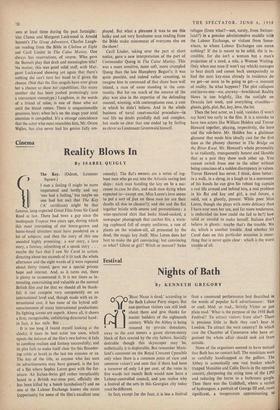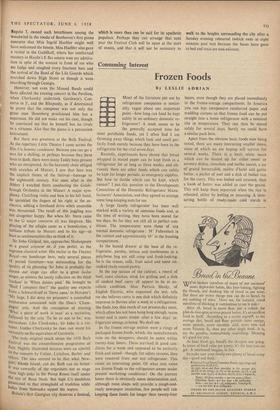Festival
Nights of Bath
By KENNETH GREGORY `BEAU NASH is dead,' according to the Bath Labour Party slogan. But non-partisan visitors can still look • about them and give thanks for master builders of the eighteenth century. While the Abbey is being 6 • restored by private donations, away to the east towers a gaunt eleven-storey block of flats erected by the city fathers. Socially desirable though this skyscraper may be, esthetically it is deplorable. But remember Mum- ford's comment on the Royal Crescent (`possible only when there is a common point of view and common values') and note that if there had been a turnover of only 1.4 per cent. of the votes in five wards last month Bath would now have a labour-controlled council, and you realise why a festival of the arts in this Georgian city today must be different.
In fact, except for the Jazz, it is less a festival than a command performance best described in the words of popular hi-fi advertisement : 'Hot or cool, Mod. or trad., Strictly Victor or just plain mad.' What is the purpose of the 1958 Bath Festival? To attract visitors from afar? There is precious little in Bath they can't hear in London. To attract the west country? In which case the Chamber of Commerce who have or- ganised the whole affair should seek aid from outside.
None of the organisers seemed to have noticed that Bath has no concert hall. The musicians were as carefully handicapped as the golfers. The Abbey is acoustically one vast bunker which trapped Menuhin and Colin Davis in the opening concert, sharpening the string tone of the LPO and reducing the horns to a bathroom gurgle. Then there was the Guildhall, where a surfeit of hydrangeas, a portrait of George III and, more significant, a temperature approximating to Regulo 7, caused such breathiness among the woodwind in the rondo of Beethoven's first piano concerto that Miss Ingrid Haebler might well have welcomed the breeze. Miss Haebler also gave a recital in the Guildhall, where her intellectual mastery in Haydn's E flat sonata won my admira- tion in spite of the woman in front of me who ate fudge and coughed every fourteen bars and the arrival of the Band of the Life Guards which marched down High Street as though it were marching through Georgia.
However, not even the Massed Bands could have affected the evening concert in the Pavilion, when Cherkassky undertook Gershwin's Con- certo in F, and the Rhapsody, as if determined to prove that the composer was not only the great man Shoenberg proclaimed him but a superman. He did not make out his case, though he convinced me that he himself has no rivals as a virtuoso. Also that the piano is a percussion instrument.
But there was greatness at the Bath Festival. At the repertory Little Theatre I came across the film Un homme condamne. Because you can get a seat for a shilling, or perhaps because they have taste in Bath, there were many Teddy boys present who sat enraptured. As the heavenly choir obliged with snatches of Mozart, I saw that here was the implicit theme of the festival—homage to the eighteenth century. For soon after in the Abbey I watched Stern conducting the Golds- brough Orchestra in the Mozart A major sym- phony. Clutching violin and bow in his left hand, he sprinkled the fingers of his right at the or- chestra, adding a forehand drive when ensemble was threatened. The result of this juggling was not altogether happy. But when Mr. Stern came to the G major concerto all was forgiven. His Playing of the adagio came as a benediction, a sublime tribute to Mozart and to his age—at least as sentimentalists like to think of it.
Sir John Gielgud, too, approaches Shakespeare as a grand seigneur or, if you prefer, as the supreme classical actor. His recital in the Theatre Royal—no handicaps here, only several pieces of period furniture—was outstanding for the quality of its phrasing. Sir John is probably the closest our stage can offer to a great lieder singer, as witness the lovely inflection on the third `Cuckoo' in 'When daisies pied.' He brought to `Shall I compare thee?' the quality one expects from a Schwarzkopf in `Dove sono,' to Hotspur's °My liege, I did deny no prisoners' a controlled exuberance associated with the Don's `Chain- Pagne aria. And the conception of treating `What a piece of work is man' as a recitative, follOwed by the aria `To be or not to be,' was Miraculous. Like Cherkassky, Sir John is a vir- tuoso. Unlike Cherkassky he does not waste his virtuosity on the equivalent of Gershwin.
The truly original touch about the 1958 Bath Festival was the comprehensive programme of Jazz. Nightly illustrated lectures were an aperitif to the concerts by Colyer, Lyttelton, Barber and others. The idea seemed to be that what New- Port; Rhode Island, can do, Bath can do better. It Was cowardly of the organisers not to stage these high jinks in the Pump Room itself under the eye of Beau Nash. But high C's doubtless Penetrated to that stronghold of tradition while ladies from Nebraska sipped the waters.
Britain's first Georgian city deserves a festival, which Is more than can be said for its apathetic populace. Perhaps they can arrange that next year the Festival Club will be open at the start of events, and that it will not be necessary to walk to the heights surrounding the city after a Sunday evening rehearsal (which ends at eight minutes past ten) because the buses have gone to bed and taxis are non-existent.











































 Previous page
Previous page